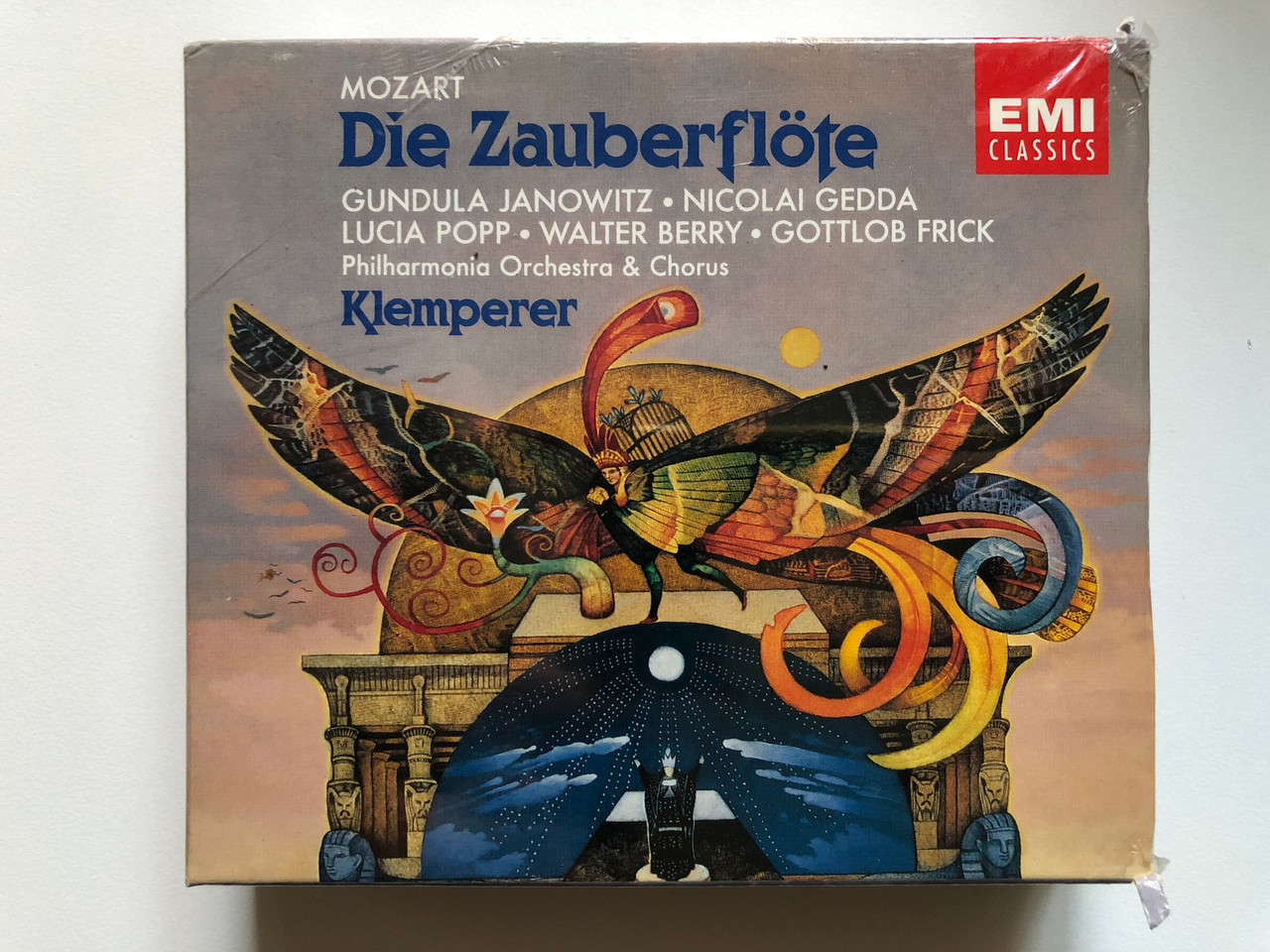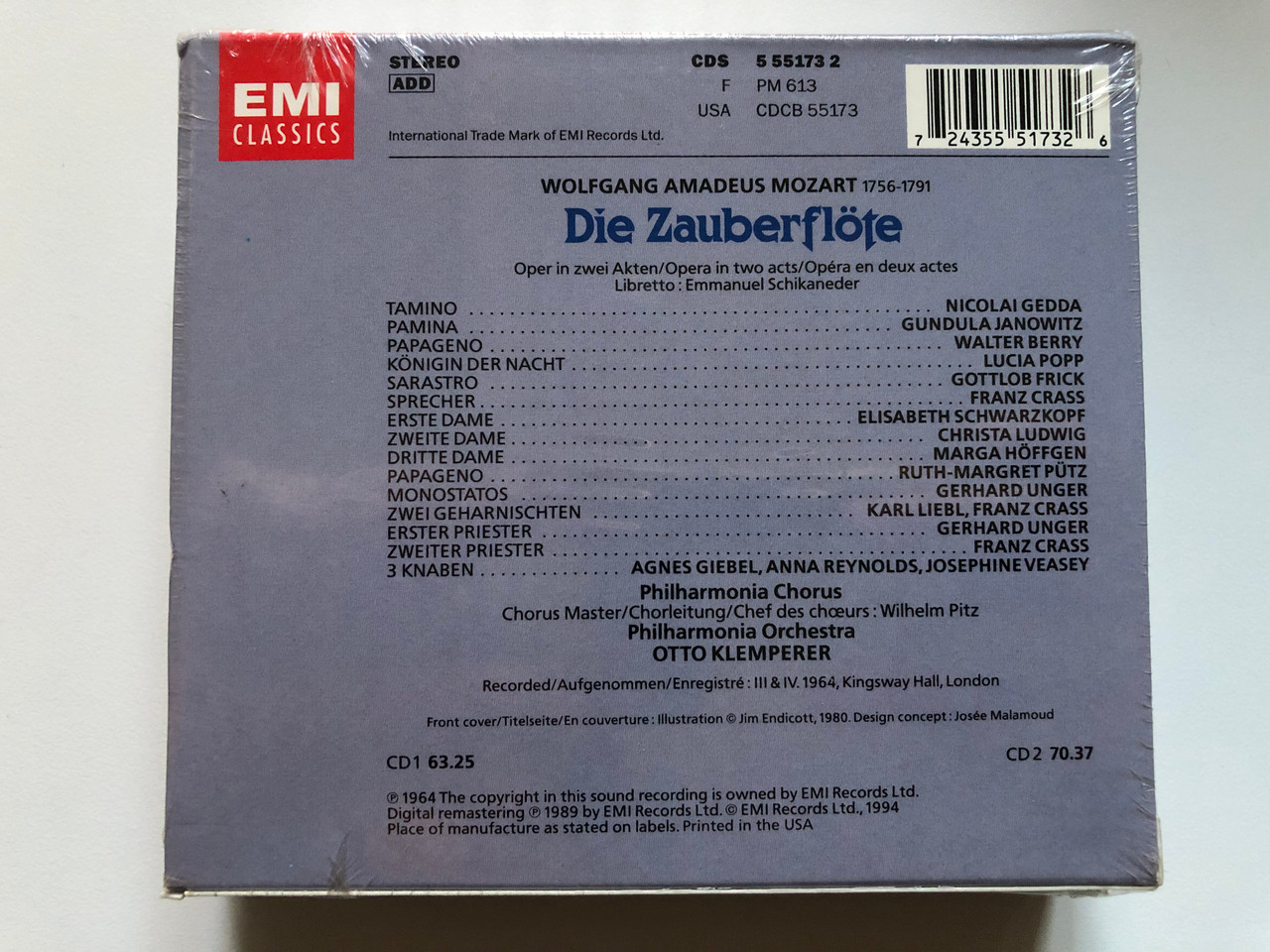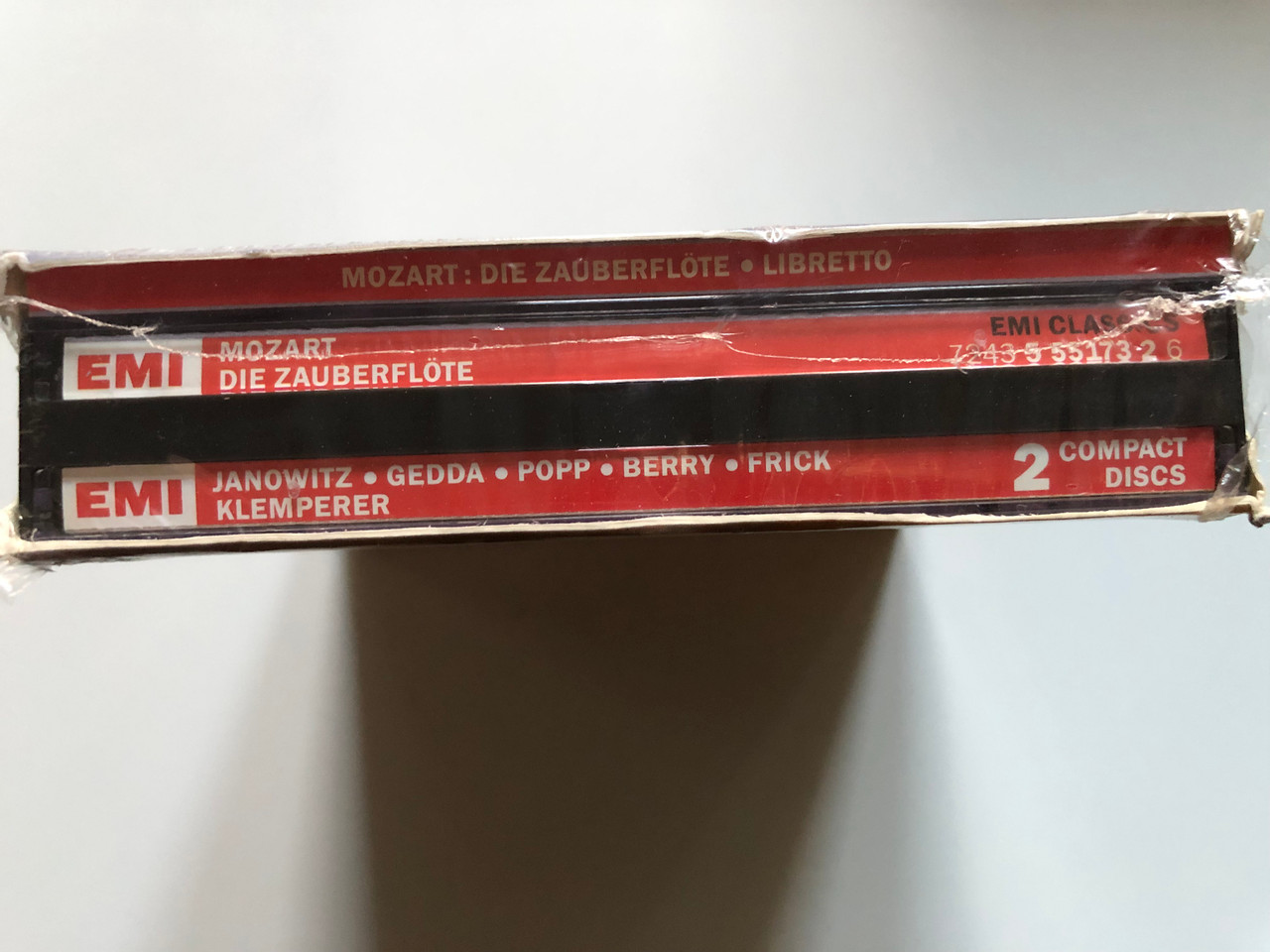Mozart - Die Zauberflöte / Gundula Janowitz, Nicolai Gedda, Lucia Popp, Walter Berry, Gottlob Frick, Philharmonia Orchestra & Chorus, Klemperer / EMI 2x Audio CD 1994 Stereo / 724355517326
UPC 724355517326
The Magic Flute (German: Die Zauberflöte, pronounced [ˈdiː ˈt͡saʊ̯bɐˌfløːtə]), K. 620, is an opera in two acts by Wolfgang Amadeus Mozart to a German libretto by Emanuel Schikaneder. The work is in the form of a Singspiel, a popular form during the time it was written that included both singing and spoken dialogue. The work premiered on 30 September 1791 at Schikaneder's theatre, the Freihaus-Theater auf der Wieden in Vienna, just two months before the composer's premature death. Still a staple of the opera repertory, its popularity was reflected by two immediate sequels, Peter Winter's Das Labyrinth oder Der Kampf mit den Elementen. Der Zauberflöte zweyter Theil (1798) and a fragmentary libretto by Johann Wolfgang von Goethe titled The Magic Flute Part Two.
The allegorical plot was influenced by Schikaneder and Mozart's interest in Freemasonry and concerns the initiation of Prince Tamino. Enlisted by the Queen of the Night to rescue her daughter Pamina from the high priest Sarastro, Tamino comes to admire the high ideals of the latter and he and Pamina both join Sarastro's community, while the Queen and her allies are vanquished.
| Label: |
EMI – 724355517326
|
|---|
| Format: |
2 x CD, Stereo, Box Set
|
|---|
| Country: |
Europe |
|---|
Released:
|
1994 |
|---|
| Genre: |
Classical, Stage & Screen |
|---|
| Style: |
Opera, Classical |
|---|
Tracklist:
| 1-1 |
|
Ouvertüre |
7:13 |
| |
|
Erste Akt
|
|
| 1-2 |
|
Nr. 1 Introduktion |
6:56 |
| 1-3 |
|
Nr. 2 Lied "Der Vogelfänger Bin Ich Ja" |
2:42 |
| 1-4 |
|
Nr. 3 Arie "Dies Bildnis Ist Bezaubernd Schön" |
4:11 |
| 1-5 |
|
Nr. 4 Rezitativ Und Arie "O Zittre Nicht, Mein Lieber Sohn!" |
6:10 |
| 1-6 |
|
Nr. 5 Quintett "Hm! Hm! Hm! Hm! / Der Arme Kann Von Strafe Sagen" |
6:46 |
| 1-7 |
|
Nr. 6 Terzett "Du Feines Täubchen, Nun Hinein!" |
1:56 |
| 1-8 |
|
Nr. 7 Duett "Bei Männern, Welche Liebe Fühlen" |
3:36 |
| |
|
Nr. 8 Finale
|
|
| 1-9 |
|
"Zum Ziele Führt Dich Diese Bahn" |
10:06 |
| 1-10 |
|
"Wie Stark Ist Nicht Dein Zauberton! |
2:55 |
| 1-11 |
|
"Schnelle Füsse, Rascher Mut" |
2:35 |
| 1-12 |
|
"Könnte Jeder Brave Mann" |
1:41 |
| 1-13 |
|
"Es Lebe Sarastro" |
4:04 |
| 1-14 |
|
"Nun, Stolzer Jüngling, Nur Hierher!" |
3:31 |
| |
|
Zweiter Akt
|
|
| 2-1 |
|
Nr. 9 Marsch Der Priester |
4:07 |
| 2-2 |
|
Nr. 10 Arie Und Chor "O Isis Und Osiris" |
3:16 |
| 2-3 |
|
Nr. 11 Duett "Bewahret Euch Vor Weiberstücken" |
1:10 |
| 2-4 |
|
Nr. 12 Quintett "Wie? Wie? Wie? Ihr An Diesem Schreckensorte" |
3:27 |
| 2-5 |
|
Nr. 13 Arie "Alles Fühlt Der Liebe Freuden" |
1:23 |
| 2-6 |
|
Nr. 14 Arie "Der Hölle Rache Kocht In Meinem Herzen" |
3:13 |
| 2-7 |
|
Nr. 15 Arie "In Diesen Heil´gen Hallen" |
4:49 |
| 2-8 |
|
Nr. 16 Terzett "Seid Uns Zum Zweiten Mal Wilkommen" |
1:56 |
| 2-9 |
|
Nr. 17 Arie "Ach, Ich Fühl´, Es Ist Verschwunden" |
4:09 |
| 2-10 |
|
Nr. 18 Chor "O Isis Und Osiris" |
3:13 |
| 2-11 |
|
Nr. 19 Terzett "Soll Ich Dich, Teurer! Nicht Mehr Sehn?" |
3:17 |
| 2-12 |
|
Nr. 20 Arie "Ein Mädchen Oder Weibchen" |
4:19 |
| |
|
Nr. 21 Finale
|
|
| 2-13 |
|
"Bald Prangt, Den Morgen Zu Verkünden" |
6:24 |
| 2-14 |
|
"Der, Welcher Wandelt Diese Straße Voll Beschwerden" |
5:14 |
| 2-15 |
|
"Tamino Mein! O Welch Ein Glück!" |
7:00 |
| 2-17 |
|
"Pa-pa-gena! Pa-pa-gena!" |
2:49 |
| 2-18 |
|
"Nur Stille..." |
2:11 |
| 2-19 |
|
"Die Strahlen der Sonne..." |
3:01 |
- Alto Vocals [Dritte Dame] – Marga Höffgen
- Artwork – Jim Endicott
- Bass Vocals [Papageno] – Walter Berry
- Bass Vocals [Sarastro] – Gottlob Frick
- Bass Vocals [Sprecher, Zweiter Priester, Zweiter Geharnischter] – Franz Crass
- Choir – Der Philharmonia Chor London
- Chorus Master – Wilhelm Pitz
- Composed By – Wolfgang Amadeus Mozart
- Conductor – Otto Klemperer
- Engineer – Robert Gooch
- Glockenspiel, Repetiteur – Heinrich Schmidt
- Libretto By – Emanuel Schikaneder
- Liner Notes – William Mann
- Mezzo-soprano Vocals [Dritter Knabe] – Josephine Veasey
- Mezzo-soprano Vocals [Zweite Dame] – Christa Ludwig
- Orchestra – Das Philharmonia Orchester London
- Producer – Peter Andry
- Soprano Vocals [Erste Dame] – Elisabeth Schwarzkopf
- Soprano Vocals [Erster Knabe] – Agnes Giebel
- Soprano Vocals [Königin Der Nacht] – Lucia Popp
- Soprano Vocals [Pamina] – Gundula Janowitz
- Soprano Vocals [Papagena] – Ruth-Margret Pütz
- Soprano Vocals [Zweiter Knabe] – Anna Reynolds
- Tenor Vocals [Erster Geharnischter] – Karl Liebl
- Tenor Vocals [Erster Priester, Monostatos] – Gerhard Unger
- Tenor Vocals [Tamino] – Nicolai Gedda































